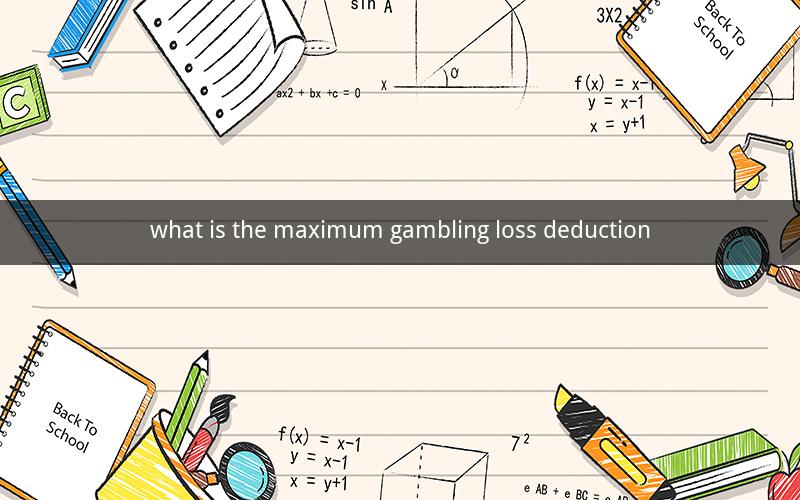
The Comprehensive Guide to Maximum Gambling Loss Deduction
Table of Contents
1. Introduction to Gambling Loss Deduction
2. Understanding the IRS Guidelines
3. Qualifying for the Deduction
4. Documentation and Record Keeping
5. Tax Filing Process
6. Common Scenarios and Examples
7. The Impact of Tax Brackets
8. The Difference Between Casual and Professional Gamblers
9. Strategies to Maximize Your Deduction
10. The Role of Tax Professionals
1. Introduction to Gambling Loss Deduction
Gambling can be an expensive hobby, and the financial burden of losing money at the tables, casinos, or racetracks can be mitigated by claiming a gambling loss deduction on your taxes. However, understanding the rules and regulations surrounding this deduction is crucial to ensure compliance with the IRS and to maximize your tax benefits.
2. Understanding the IRS Guidelines
The Internal Revenue Service (IRS) has specific guidelines for reporting and claiming gambling losses. According to IRS Publication 529, "Gambling (Including Lottery Winnings)," taxpayers who incur gambling losses may deduct those losses, subject to certain conditions and limitations.
3. Qualifying for the Deduction
To qualify for the gambling loss deduction, the following criteria must be met:
- The loss must be documented with receipts, statements, or other substantiation.
- The losses must be from lawful gambling activities, which may include horse races, slot machines, poker, sports betting, or lotteries.
- The losses must be declared as miscellaneous itemized deductions on Schedule A.
- The deductions cannot exceed the amount of gambling winnings reported on your tax return.
4. Documentation and Record Keeping
Proper documentation is essential when claiming a gambling loss deduction. This includes:
- Casino win/loss statements
- Poker hand histories
- Lottery tickets
- Betting slips
- Receipts from racetracks
- Any other records that support your claimed losses
5. Tax Filing Process
When claiming the gambling loss deduction, follow these steps:
1. Calculate your total gambling losses for the tax year.
2. Enter your gambling winnings on Schedule 1 (Form 1040).
3. Enter your total gambling losses on Schedule A (Form 1040) under the miscellaneous itemized deductions section.
4. Subtract the total of all other itemized deductions from your adjusted gross income (AGI).
5. Include the resulting amount on line 21 of Form 1040.
6. Common Scenarios and Examples
Scenario 1: Losses from a Casino
John spends $10,000 at a casino, playing blackjack and slots. He wins $3,000. His total gambling loss is $7,000 ($10,000 - $3,000). To claim the deduction, he will report his $3,000 winnings on Schedule 1 (Form 1040) and enter $7,000 as a miscellaneous itemized deduction on Schedule A (Form 1040).
Scenario 2: Losses from a Poker Tournament
Lisa participates in a $500 poker tournament, winning $100. Her total losses from poker tournaments throughout the year amount to $3,000. Since her total losses exceed her winnings, she can deduct the entire $3,000 as a miscellaneous itemized deduction on Schedule A (Form 1040).
7. The Impact of Tax Brackets
The impact of the gambling loss deduction on your tax bracket depends on the total amount of deductions you claim, including other itemized deductions such as mortgage interest, property taxes, and medical expenses. As your taxable income decreases due to higher deductions, your effective tax rate may decrease.
8. The Difference Between Casual and Professional Gamblers
The IRS distinguishes between casual and professional gamblers when determining the tax treatment of gambling losses. Casual gamblers can deduct their losses up to the amount of their winnings, while professional gamblers can deduct their losses as a business expense.
9. Strategies to Maximize Your Deduction
To maximize your gambling loss deduction, consider the following strategies:
- Keep meticulous records of your winnings and losses.
- Separate your gambling activities from other personal expenses.
- Use tax software or a tax professional to ensure accurate reporting.
10. The Role of Tax Professionals
Tax professionals can provide valuable guidance when it comes to claiming a gambling loss deduction. They can help you navigate the complexities of tax law and ensure that you take advantage of all available deductions and credits.
FAQs
1. What types of gambling losses are deductible?
Gambling losses from lawful activities, such as horse races, slot machines, poker, sports betting, and lotteries, are deductible.
2. Can I deduct gambling losses if I'm not itemizing deductions?
No, gambling losses are only deductible if you're itemizing deductions on Schedule A (Form 1040).
3. How do I prove my gambling losses?
You can use receipts, statements, or other documentation from the gambling establishment or from your personal records.
4. Are online gambling losses deductible?
Yes, online gambling losses are deductible, provided they meet the requirements set by the IRS.
5. Can I deduct gambling losses if I win money in a non-gambling contest?
No, the deduction is only available for actual gambling losses.
6. Do I need to report all of my gambling winnings?
Yes, all gambling winnings, regardless of whether you deduct losses, must be reported on your tax return.
7. Can I deduct losses from gambling in foreign countries?
Yes, you can deduct gambling losses from foreign countries, provided they meet the IRS guidelines.
8. How do I report gambling winnings from a lottery?
Report your lottery winnings on Schedule 1 (Form 1040).
9. Can I deduct gambling losses if I'm a professional gambler?
Professional gamblers can deduct gambling losses as a business expense, but the requirements are different from those for casual gamblers.
10. Should I consult a tax professional if I'm claiming a gambling loss deduction?
Yes, tax professionals can help you understand the rules and regulations and ensure accurate reporting.